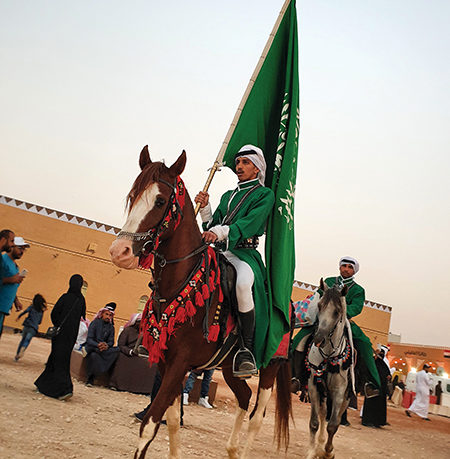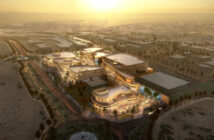By Aevan Caro
More than 120 kilometers northeast of the Kingdom’s capital, thousands of guests and visitors have gathered to attend the third King Abdulaziz Camel Festival.
The prestigious annual festival, which ran from February 5 to March 23 of this year, offered a huge variety of cultural events and educational activities open for the public to enjoy. The list of numerous activities includes camel beauty contest, camel race, caravan activities, multi-cultural sports and bazaars. This year’s event features “Nomad Universe”, considered as the world’s largest ethnofestival, that showcases the preservation and revival of historical heritage and diversity of the original culture of people and ethnic groups from all over the world.

The Camel Heritage
Camels play a significant role in Saudi Arabia’s heritage and culture. The King Abdul Aziz Camel Festival puts the spotlight on them to continuously develop the camel tradition in the Arabia culture. It is focused on the importance of camels which constantly plays a vital role in the lives of Arabs. Known as the “ships of the desert,” camels are strong reliable means of transportation and reliable companions of people in the early ages. Up to now, they are celebrated in Saudi Arabia and other Gulf countries for their contribution in both economic and cultural aspects of the community.
With the Kingdom’s Camel Club, the festival has evolved over the years from being just a camel beauty contest to a grand event that features an increasing number of activities that all ages can enjoy. Under the patronage of the Custodian of the Two Holy Mosques King Salman bin Abdul Aziz, the camel festival has grown to become a bigger event that “promotes participation, accentuates heritage, propagates nationalism, and reflects the culture of Saudi Arabia.
The festival has attracted camel owners and enthusiasts from across the Arabia Peninsula to participate in what has been branded as “the largest camel festival in the world.” Several agencies also contribute to the festival such as the Ministry of Interior, Ministry of Health, Ministry of Environment, Water, and Agriculture, General Entertainment Authority and so much more making this an event that is not to be missed!

Festivities and Activities
Since camels are the stars of the festival, camel-related activities are widespread within the venue. In the morning, beauty contests for camels were held with prizes amounting to more than SR100 million. Camel races are attended by local and international camel racing enthusiasts. Camel exhibits and close encounters such as petting and camel rides are also made available for both children and adults.
Aside from camels, the festival also offered diverse exhibits from different countries and cultures. Some of the multi-cultural activities are bull riding rodeo sport which featured professional riders and American bulls, the Khan El Khalili market which depicted Cairo, Egypt’s traditional marketplace consisting of Egyptian souvenirs and products, and one of the festival’s main highlights, the Nomad Universe.
Multi-cultural Ethnicity
In cooperation between the Camel Club and World Ethnogames Confederation (WEC) of Kyrgyzstan, Nomad Universe, has been organized to take part in the King Abdulaziz Camel Festival.
At the spectacular opening ceremony of the Nomad Universe last March 15, 2019, the host country of Kyrgysztan showcased the different ethnic sports including horse riding, archery, hunting, wrestling, falconry, and traditional Kyrgyz dances and music.
An Ethno Village was built at the festival where exhibitions of different nomad games were held to demonstrate the preserved heritage of ethnic sports practiced by various countries while participants wear their traditional costumes.
Among the participants is Ronildo “Rhon” Palmera, a member of the Philippine delegation who brought the “traditional and intellectual game” called sungka, a Filipino variation of the mancala game, to the World Nomad Games.
“The promotion of sungka makes me feel happy and proud,” Rhon said, “Many Filipino youth does not know how to play traditional games nowadays since most of them are hooked more with mobile and online games.” His efforts to promote sungka reflect one of the main objectives of the World Nomad Games which is to preserve cultural and historical heritage as well as the diversity of people from all over the world in this era of globalization.
“The collaboration between WEC and Camel Club for Nomad Universe gave us a bigger exposure as it also widened the range of participants,” Rhon added. The exhibition of games took place from February 9 to 19, 2019, a 10-day-period of promoting and popularizing ethnic sports to the Saudi Arabia crowd.
The King Abdulaziz Camel Festival became more interesting as each guest walked deeper inside the venue. A movie venue, “Cinemastan,” was built to show 90 short movies featuring cultural legends of the nomadic culture.
The festival also included an Ethno Bazaar, an area where shops sold souvenir items, national costumes, traditional musical instruments, and local delicacies. Roaming around the bazaar is like traveling around the world in a span of a few minutes! Crowds flocked to the stores where the locals of their respective countries perform their traditional music.
The King Abdulaziz Camel Festival and the Nomad Universe are definitely two of the most interesting and exciting cultural events that happened in Riyadh early this year. In the era of technological evolution, attending events like these teaches us not to lose interest with our heritage, ethnicity, and traditions. There is still a huge place for the past that enriches our present and our future.




